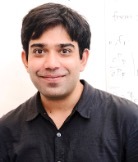Sep
04

Date: 04 September 2025
Time: 9:30 AM ET (New York Time)
Presenter(s): Dr. Ayush Bhandari
Abstract
The digitization of information has profoundly transformed human lives. At the core of this process lies quantization—the rounding of time and amplitude by analog-to-digital converters, a concept taught widely in engineering education.
The Shannon–Nyquist theorem (1949) proves that time quantization can be lossless, but amplitude quantization introduces quantization noise, exposing a fundamental trade-off between digital resolution and dynamic range.
Can we recover a signal from quantization noise alone? Remarkably, the answer is “yes!” Even more surprising is that this recovery follows the well-known Nyquist criterion. This approach, which redefines quantization noise (QN) as the digital signal itself, is at the core of the Unlimited Sensing Framework (USF). Rooted in an intriguing mathematical principle, the USF exploits the fact that, for smooth functions, their fractional parts (the QN) encode their integer parts (the digital signal). By leveraging this insight, the USF fundamentally redefines digital acquisition, breaking the range-resolution barrier in conventional methods and creating new opportunities across all application areas involving digital sensing.
This talk presents a first-principles introduction to USF, spanning theory, algorithms, hardware, and experiments, and highlights breakthroughs in sub-Nyquist sampling, radar/communications, and computational imaging via modulo non-linearities.
Biography

Dr. Ayush Bhandari
received Ph.D. degree from Massachusetts Institute of Technology (MIT), Cambridge, MA, USA, in 2018, for his work on computational sensing and imaging which, in part, led to the co-authored open-access book Computational Imaging in MIT Press (2022).
He is currently a faculty member with the Department of Electrical and Electronic Engineering, Imperial College London, U. K. and has held research positions at INRIA (Rennes), France, Nanyang Technological University, Singapore, the Chinese University of Hong Kong and Ecole Polytechnique Fédérale de Lausanne (EPFL), Switzerland among other institutes. He was appointed the August–Wilhelm Scheer Visiting Professor (Department of Mathematics), in 2019 by the Technical University of Munich.
Dr. Bhandari’s tutorials have been featured at various venues, including ACM SIGGRAPH (2014, 2015), IEEE ICCV (2015), SPCOM (2024), EUSIPCO (2024), IEEE ICASSP (2025) and IEEE SSP (2025). He was the keynote speaker at venues including 2023 Intl. Symposium on Computational Sensing (ISCS), 2021 IEEE CVPR (Workshop on Computational Cameras and Displays), 2021 SPIE Photonics West (AI and Optical Data Sciences track), and 2018 CoSeRa (Intl. Workshop on Compressed Sensing applied to Radar, Multimodal Sensing and Imaging). Some aspects of his work have led to new sensing and imaging modalities which have been widely covered in press and media (e.g. BBC news). Applied aspects of his research have led to more than 10 US patents. His scientific contributions have led to numerous prizes, most recently, the Best Paper Award at IEEE ICCP 2020 (Intl. Conf. on Computational Photography) and the Best Student Paper Award (senior co-author) at IEEE ICASSP 2019 (Intl. Conf. on Acoustics, Speech and Signal Processing). In 2020, his doctoral work was awarded the IEEE Best Ph.D. Dissertation Award from the Signal Processing Society. In 2021, he received the President's Medal for Outstanding Early Career Researcher at Imperial College London. In 2023, he was the recipient of the Frontiers of Science Award at the International Congress of Basic Science (ICBS) for pioneering the Unlimited Sensing Framework. In 2024, he was awarded the ERC Starting Grant for his work on computational sensing.
